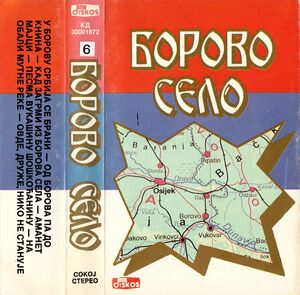Borovo Selo
Borovo Selo (Serbian Cyrillic: Борово Село), also known as U Borovu Srbija se brani (Serbian Cyrillic: У Борову Србија се Брани, lit. "In Borovo, Serbia Defends Itself") is the debut album of Serb war singer Branko Marinković -Lalić, released in 1991 by Diskos.
| Борово Село | ||||
|---|---|---|---|---|
 | ||||
| Studio album by | ||||
| Released | 1991 | |||
| Genre | Novokompovana | |||
| Length | 25:51 | |||
| Label | Diskos | |||
| Producer | Дафинић Миломир | |||
| Бранко Маринковић - Лалић chronology | ||||
| ||||
Background
Following the multi-party elections held in Croatia on April 22nd, 1990, the Croatian Democratic Union (HDZ) would win, with its political intentions being independence from Yugoslavia. With the political situation in the SR Croatia deteriorating rapidly and a rebirth of Croat nationalism, the Serb population feared for their safety and wanted their own independence from Croatia. The prelude to the Croatian War, the Log Revolution, came to be on August 17th, 1990 and lasted until December. Here the Serbs put up barricades strategically blockading roads with logs cut down from nearby woods, aiming to create their own state, the SAO Kninska Krajina. As ethnic tensions continued to grow, in 1991 the village of Borovo selo, a part of Vukovar municipality with a predominantly Serb population, was also barricaded on April 1st out of fear for clashes like the Plitvice Lakes incident just a day before. On April 14th there were meetings between the residents of Borovo Selo, led by Vukašin Šoškoćanin and Croatian authorities in Vukovar to secure some form of peace in the area, but to no avail as in mid-April three rockets were fired by Croat positions outside of Borovo Selo as provocation. This only fueled the fire and led to Serb paramilitaries being called by the residents out of fear for safety and protection and figures like Vojislav Šešelj agitating the already irritated population with speeches and recruiting them to fight.
On the 1st of May 1991 after Croat policemen entered Borovo Selo to replace a Yugoslav flag with the flag of Croatia, this resulted in an armed clash where two police officers were captured by Serb forces. Conflict would start on May the 2nd. After negotiations by Šoškoćanin and Croat authorities to remove the barricades and promises to resolve the conflict peacefully, two busses filled with Croat policemen entered the village. The Serbs saw this as an attack and paramilitaries promptly ambushed the two busses. Reinforcements came and a firefight ensued which lasted until 2:30pm. Twelve Croat policemen were killed and 21 injured in the ambush.
The conflict in Borovo Selo is generally seen as the start of the Croatian war.
Release
Borovo Selo was released when the Croatian war was underway and is generally viewed as one of the first cassettes made during the conflict. As a result, the musical style of the album is closer to traditional folk, which makes it unique compared to later war albums. Due to the topics covered, it is assumed that the album's release was mid-to-late 1991 by Diskos. It is Branko Marinković's first studio album and dramatizes the conflict in Borovo Selo, as well as the subsequent uprising of Serbs in the rest of Croatia. The songs are generally sad in nature with mention the loss of homes, possessions, and life. It also contains songs directed against Croat forces mentioning the clashes between them and Serb forces.
There are two known issues of the cassette: the first issue, which was printed by GIP Beograd in 1991, features a faded cover made out of thicker paper with a reflective gold print with the tape audio being in high audio quality. The second issue uses thinner paper, has more vibrant colors with a non-reflective gold print and the tape the audio quality being great, but heavily saturated.
On November 10, 2020, the album was released on Youtube via the topic feature and digital music streaming services. The j-card used as the cover image comes from the scan provided on the music collecting site Discogs.[1] The cover is digitally altered as the current rights holder is MINT Production. With the current state of rights within the war music genre, however, the legitimacy of the rights are questionable at best. The source of the audio used for the upload is unknown.
Track listing
All lyrics are written by Branko Marinković - Lalić except where noted.
| No. | Title | Length |
|---|---|---|
| 1. | "У Борову Србија се брани" | 2:57 |
| 2. | "Од Борова па до Книна" | 2:37 |
| 3. | "Кад загрми из Борова Села" | 2:45 |
| 4. | "Аманет мајци" | 2:23 |
| No. | Title | Writer(s) | Length |
|---|---|---|---|
| 1. | "Песма Вукашину Шошкоћанину" | 3:00 | |
| 2. | "На обали мутне реке" | 3:24 | |
| 3. | "Овде, друже, нико не станује" | Жељко Ристић | 5:21 |
| Total length: | 25:51 | ||
Personnel
Writing
- Бранко Маринковић-Лалић - Композитор (Composer), тескт и аранжмани (Lyrics and arrangement)
- Оркестар Стевана Николића (Orchestra)
- Стевива Јовановић - Хармонике (Accordion)
Production
- Дафинић Миломир - Продуцент (Producer)
- Здравко Пантелић - Извршни продуцент (Executive producer)
- Милодраг Милутиновић - Главни и одговорни уредник (Editor in chief)
Miscellaneous
Посебно се захаваљујемо Ивану и Марију
Variants
- Very good audio quality
- Faded cover
- Faded labels
- Thicker paper
- Shiny gold print
- Very good audio quality but high saturation
- GIP Beograd logo is missing on back of j-card
- Decent audio quality
- Standard J-Card paper
- Gold is non-reflective
References
- ↑ Бранко Маринковић - Лалић - Борово Село. Discogs. 28 March 2017. Retrieved 19 October 2023.